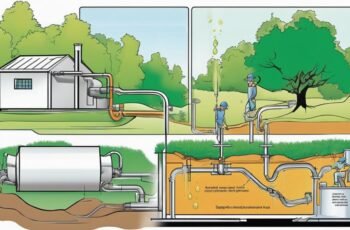Skipping septic system treatment exposes you to health hazards like bacterial contamination and sewage overflow. Without treatment, malfunctions can leak harmful bacteria into the soil, causing unsanitary conditions and property damage. Groundwater contamination risk increases as untreated sewage infiltrates water sources, making them unsafe. Property damage, foul odors, and legal compliance issues can arise. Regular treatment and maintenance are essential to prevent these problems. Taking timely action can mitigate damage and avoid costly repairs. Understanding local regulations and complying with inspection requirements is critical. Prioritizing proper treatment and maintenance optimizes system functions and prevents further complications.
Key Takeaways
- Risk of harmful bacteria contaminating surroundings.
- Increased likelihood of system malfunctions and backups.
- Escalated groundwater contamination risk.
- Property damage, odors, and health hazards.
- Potential legal compliance issues leading to fines.
Potential Health Hazards
When skipping septic system treatment, you are exposing yourself and your household to potential health hazards. Neglecting septic system maintenance can lead to illness risks and have a negative environmental impact. Septic systems rely on a delicate balance of bacteria to break down sewage and organic matter. Without proper care, this balance can be disrupted, causing harmful pathogens to contaminate your surroundings.
The buildup of sludge and scum in an untreated septic system can result in the release of disease-causing bacteria and viruses into the environment. These pathogens can seep into your groundwater, posing a risk not only to your health but also to the well-being of your community. Additionally, the foul odors emanating from a neglected septic system are not only unpleasant but also indicative of potentially harmful gases being released.
To mitigate the illness risks and environmental impact associated with skipping septic system treatment, it is essential to adhere to a regular maintenance schedule. By investing in proper care and maintenance, you can safeguard the health and safety of your household and the surrounding ecosystem.
System Malfunctions and Backups
Experiencing system malfunctions and backups in your septic system can result in significant disruptions to your daily routine and potential damage to your property. When neglecting septic system treatment, you risk encountering these issues, which can lead to environmental impact and costly repairs. Here's what you need to know:
- Environmental Impact: System malfunctions can leak harmful bacteria and contaminants into the soil, affecting groundwater quality and nearby ecosystems. Using a high-quality septic tank treatment like SEPTIFIX can help prevent these environmental hazards.
- Property Damage: Backups can cause sewage to overflow into your home or yard, leading to unsanitary conditions and property damage.
- Odor Concerns: Malfunctions often result in foul odors around your property, impacting your comfort and potentially bothering neighbors.
- Health Risks: Exposure to untreated wastewater poses health risks to you and your family, increasing the chances of infections and illnesses.
- Costly Repairs: Neglecting maintenance can result in expensive repairs or even the need for a full system replacement, causing financial strain.
Groundwater Contamination Risk
System malfunctions and backups in your septic system can escalate the risk of groundwater contamination, posing a serious environmental hazard. When untreated sewage leaks into the ground, it can infiltrate the groundwater, leading to harmful effects on water quality. This contamination can introduce pathogens, nutrients, and chemicals into the groundwater, jeopardizing the health of ecosystems and human populations.
The environmental impact of groundwater contamination from a neglected septic system can be significant. Elevated levels of bacteria and other contaminants can render the water unsafe for consumption and recreational use. Additionally, pollutants from the sewage can disrupt aquatic habitats and biodiversity, further exacerbating the consequences of groundwater contamination.
To mitigate the risk of groundwater contamination, regular septic system maintenance and treatment are essential. By adhering to a proper maintenance schedule and promptly addressing any issues, you can safeguard water quality and protect the environment from the detrimental effects of untreated sewage. Remember, maintaining your septic system not only guarantees its longevity but also plays a critical role in preserving groundwater quality for future generations.
Property Damage and Odors
Wondering how neglecting septic system treatment can lead to property damage and unpleasant odors in your surroundings? When septic systems are not properly maintained, they can cause significant issues that go beyond just functionality.
- Backups and Overflows: Skipping treatment can lead to backups and overflows in your septic system, causing damage to your property and creating health hazards.
- Odor Control: Lack of treatment can result in foul odors emanating from your septic system, making your surroundings unpleasant for you and your neighbors.
- Leach Field Failure: Without proper treatment, your leach field can fail, leading to sewage backing up into your home or yard.
- Prevention Methods: Regular treatment and maintenance are essential to prevent these issues and optimize your septic system functions properly.
- Timely Action: Addressing any odors or signs of property damage promptly can help mitigate the extent of the damage and prevent further complications.
To avoid property damage and odors, prioritize odor control and follow prevention methods to keep your septic system in peak condition.
Legal Compliance Issues
To maintain your septic system's adherence to legal regulations, it is essential to comprehend the specific requirements established by local authorities. Failure to comply with these regulations can result in fines and regulatory violations. Local health departments or environmental agencies typically oversee the regulations regarding septic system maintenance. These regulations often include guidelines on how frequently the system needs to be inspected, pumped, and treated with the appropriate chemicals. By neglecting these requirements, you risk facing fines for non-compliance with regulations and potentially causing harm to the environment.
In the event of regulatory violations, you may be subject to penalties that could have been easily avoided by adhering to the prescribed maintenance schedule. Preventative measures such as regular inspections and treatments can save you from legal hassles and financial burdens associated with fines. By staying informed about the legal requirements and ensuring your septic system receives proper treatment, you can maintain compliance with regulations and avoid potential legal consequences.


